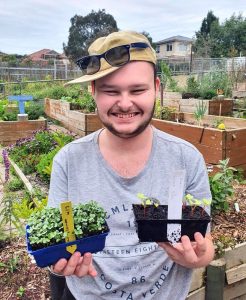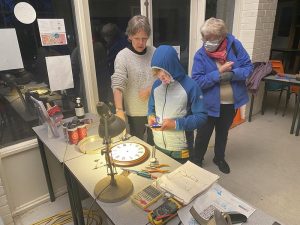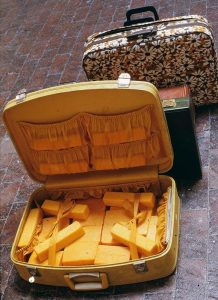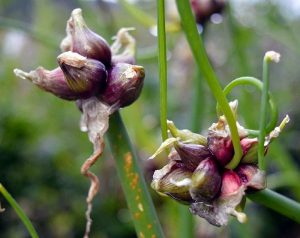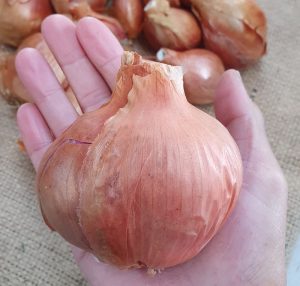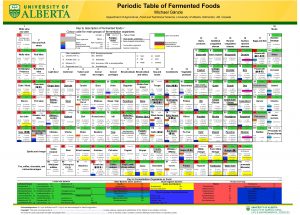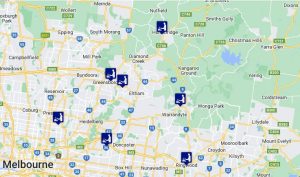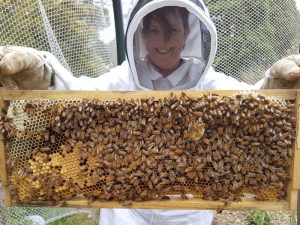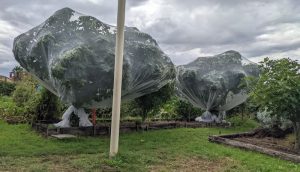Thanks to the people who have contributed to this week’s newsletter: Jaimie Sweetman, Jian Liu, Julian Merkenich, Sarah Mathers and Simone Boyd.
If you are Gmail user and didn’t successfully receive our newsletter last week, read this short guide on how to stop Google’s blocking of our future newsletters.
The more people contribute to this newsletter the better it will be but, for some reason, contributions have fallen off over the last month or so. If you have any news, tips, questions or photos that you think some of the readership might be interested in, now would be a good time to send them in. Simply email them to me (guy@localfoodconnect.org.au).
The Medlar tree (by Jaimie Sweetman)
[Jaimie Sweetman is Head Gardener of the Edible Forest located on the Yarra Valley Estate in Dixons Creek. Tours of the Edible Forest, often led by Jaimie, take place on Fridays and Saturdays – read more and book your place on a future tour.]
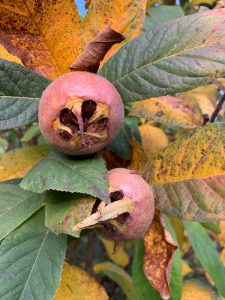 The medlar tree (Mespilus germanica) is one of my absolute favourites, especially at this time of year. I love this tree because it is harvested in winter when not much else is.
The medlar tree (Mespilus germanica) is one of my absolute favourites, especially at this time of year. I love this tree because it is harvested in winter when not much else is.
The medlar is an ancient species and was once extremely popular in Europe during the Middle Ages. In fact, you would apparently have found them in most medieval monasteries and castles. Can you recognise the fruit from old paintings?
The medlar is in the same family as apples (the rose family). When apples started to be widely cultivated, medlars were largely forgotten about. This wasn’t because they don’t taste good though; rather, it was because they quickly perish once picked and thus need to be eaten straight off the tree or turned into preserves.
Medlars need to go through a cold period so they can ‘blet’ on the tree. [Editor: ‘Bletting’, meaning the softening of certain fleshy fruits, such as medlars and persimmons, beyond ripening, until the desired degree of sweetness/palatability is attained.] The recent few nights of cold here in Melbourne should see them ready this week. The cold softens them and some even say they become like rotten fruit. They taste like stewed apple though and can be turned into jams and jellies to preserve.
Read about more of Jaimie’s unusual edible plants on our website.
Also, read Robin Gale-Baker’s guide to growing medlars.
Some unusual pumpkins
Simone Boyd, who is both a newsletter reader and the owner of the online veggie seed shop, Heirloom Naturally, has produced 4 videos about unusual pumpkins:
| Bohemian | Futsu |
| Galeux D’Eysines | Rouge Vif D’Etampes |
Tea cosies
 The 2022 Fish Creek Tea Cosy Festival recently took place. One of the exhibits was the composting teapot of St Johns Riverside Community Garden in Heidelberg and it was apparently awarded an Honourable Mention. Its name is Brewster.
The 2022 Fish Creek Tea Cosy Festival recently took place. One of the exhibits was the composting teapot of St Johns Riverside Community Garden in Heidelberg and it was apparently awarded an Honourable Mention. Its name is Brewster.
According to ABC News, a Guinness World Record was broken at the festival, namely the largest every tea cosy. At 5 metres high and 20 metres in circumference, it smashed the previous record (3.9 metres high). It was knitted by a team from Frankston and will now be deconstructed into rugs. Read more.
On the subject of tea cosies, my wife tells me that, if you stich up the spout and handle openings then they can look quite fetching as hats. I’ll try and find a photo!
Finally, St Johns Riverside Community Garden should be congratulated on their recent receipt of a grant from Banyule Council for $5K for landscaping the entrance to the garden.
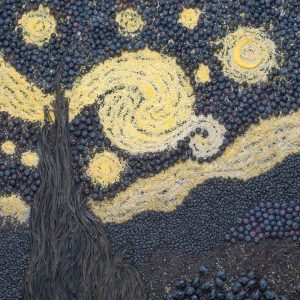 Every newsletter needs a good picture
Every newsletter needs a good picture
Tatiana Shkondina recreates famous paintings using food and then photographs them. Feature artists include Dali, Hokusai, Klimt, Magritte, Malevich, Mondrian, Picasso, Rousseau and Warhol. The picture right is Van Gogh’s Starry Night (1889) and was made with rice, blueberries and pasta. Look at some more of her creations.
Vegan gado gado (by Jian Liu & Julian Merkenich)
In this recipe, the traditional ingredients of boiled egg, prawn crackers and fish sauce are replaced by lightly fried chickpeas, rice noodles and soy sauce respectively.
The steamed ingredients
 Ingredients
Ingredients
Cauliflower, chopped into small chunks
Potatoes, chopped into small chunks
Prepare a steamer.
Steam the cauliflower and potato for 20 minutes.
The fresh ingredients
Ingredients
4 small tomatoes, cut into small cubes
1 medium carrot, shredded
1 small head cabbage, shredded
½ medium red onion, thinly sliced
1 bunch spring onions, sliced
Prepare all of the fresh ingredients.
The fried ingredients
Ingredients
2 pieces dry tofu
½ cup chickpeas
½ cup oil
2 sticks rice noodles
Break up the rice noodles into 1 inch lengths.
Heat the oil in a large wok. You may want to angle the wok slightly to make the pool of oil deeper. If you place a chopstick into the oil and it bubbles, then you’re ready.
Throw a handful of broken noodles at a time into the oil and wait a few seconds for them to puff. Place the fried noodles onto your skillet to soak up any residual oil.
Remove the noodles from the skillet, put it over medium heat, and fry the tofu and chickpeas.
The sauce
Ingredients
½ medium onion, finely diced
2 cloves garlic, sliced
1 small chilli, sliced
¾ cup peanut butter
2 tablespoons soy sauce
½ cup coconut milk (or any plant-based milk)
1 teaspoon sugar
3 tablespoons lime juice (or lemon juice)
Place the onion, garlic and chilli (i.e. the aromatics) into a small pot with a few tablespoons of water.
Saute the aromatics until they are softened and fragrant.
Add the peanut butter to the pot and mash with a spoon.
Add the soy sauce, coconut milk and sugar and mix with a spoon until you have a rich sauce.
Continue to cook the sauce on low heat for a minute.
Turn off the heat and mix the lime juice into the sauce.
Mix everything together
Put the fresh and steamed ingredients together in a large serving bowl.
Top with the sauce.
Stir until thoroughly combined and everything is coated in the sauce.
Add the fried ingredients on top.
Serve.
Read more recipes by newsletter readers on our website.
Which link was clicked most times in the last newsletter?
The most popular link in the last newsletter was Angelo Eliades’ article on how to save tomato seeds.
 Joke (or pun) of the week
Joke (or pun) of the week
Wanna hear a joke about pizza? Never mind. It’s too cheesy.
As a bonus, at their 2022 AGM, Nillumbik U3A (University of the Third Age) voted the following as the best ever joke published in their newsletter:
I recently visited a monastery and, as I walked past the kitchen, I saw a man frying chips. I asked him “Are you the friar?” He replied “No, I’m the chip monk.”
In passing, note that around 120 members of Nillumbik U3A are also readers of this newsletter.
Regular activities over the coming week
Farmers’ markets
- Saturday: Abbotsford and Coburg.
- Sunday: Alphington, Carlton and Eltham.
Food swaps
- Saturday: Blackburn North, Brunswick East, Heathmont, Heidelberg, Hurstbridge, Preston/Thornbury and Rosanna.
- Sunday: zip.
Community gardens
- Thursday: Diamond Valley Library (Greensborough), Edible Hub (Hurstbridge), SEEDs (Brunswick) and Whittlesea.
- Friday: Reynard Street (Coburg) and West Brunswick.
- Saturday: Links (Lalor), Macleod and Thrive (Diamond Creek).
- Sunday: Fawkner Food Bowls, Pentridge (Coburg) and Regent (Reservoir).
- Monday: SEEDs (Brunswick) and Whittlesea.
- Tuesday: Watsonia Library.
- Next Wednesday: Living & Learning Eltham, Macleod, Newton Street (Reservoir), Sylvester Hive (Preston) and Span (Thornbury).
Not food-related by interesting
Make a garden in a glass bowl; Saturday, 4th June, 10.30am-12.30pm; free; Hurstbridge.
Join local makers Heather Doyle and Kath Armour, founding members of Boomerang Bags Nillumbik, to make a miniature garden in a beautiful glass bowl. All materials will be supplied. You will also have the opportunity to create a mosaic on a stone base to put into your glass garden. If you have any figurines, decorative objects, or special treasures that you would like to use in your work, take them along.
Upcoming face-to-face events – introduction
You can view various calendars on our website by type of event: All once-off events, Cooking, Everything else and Free.
You can also view various calendars on our website by Council area: Banyule, Boroondara, City of Yarra, Darebin, Manningham, Maroondah, Moreland, Nillumbik, Whitehorse, Whittlesea and Yarra Ranges.
Upcoming face-to-face events – not cooking
Volunteer thankyou BBQ + gall wasp workshop; Monday, 30th May, 4-6pm; free; Preston.
Organised by Oakhill Farm. Presenter: Angelo Eliades. After the workshop, you will share a meal using Oakhill-grown veggies. You will also meet other volunteers, celebrate all that has been achieved at Oakhill, and chat about future plans.
Step to employment in hospitality (7 sessions); 7 consecutive Fridays from 3rd June,each 11.30am-5pm; free; Brunswick.
Organised by Brunswick Neighbourhood House. Learn the skills essential for working in the hospitality industry. Includes Responsible Service of Alcohol (RSA) and Safe Food Handling certificates, coffee making, and more. Enrol by either phone (9386 9418) or email (info@bnhc.vic.edu.au).
How to control the Queensland Fruit Fly, with Angelo Eliades; Tuesday, 23rd June, 7-8pm; free; Watsonia.
Organised by Watsonia Library. In this workshop, you will learn about the best ways to manage them, how to achieve the best control outcomes using a strategic pest management approach (IPM), what products to use, as well as how and when to use them. Angelo will also demonstrate how to make your own fruit fly trap.
Complete urban farmer (14 sessions); weekly, starting Thursday, 21st July, 9am-3pm; $880 ($10 per hour); CERES.
Presenters: Justin Calverley and Donna Livermore. The topics to be covered will include: permaculture; fruit production; soil preparation; beekeeping; composting, worm farming and fertilisers; vegetable growing; propagation; seed collection; pest & disease management; bushfoods & berries; chooks; and community gardens.
Beeswax wraps; Saturday, 23rd July, 10am-midday; $75 ($38 per hour); CERES.
What you will learn: how to make and maintain their own beeswax wraps; learn skills that are transferable to the home environment; and bundling techniques. Presenter: Emma Grace. You will learn how to make and maintain their own beeswax wraps for keeping food fresh and hygienic without the use of single-use plastics such as cling-wrap. This is a hands-on workshop where participants will make their own washable and re-usable ready-to-use beeswax wraps.
In May
- Mushroom foraging; Friday, 27th May, 10am-2pm; $122 ($31 per hour); Forest Hill.
- Growing Winter veggies; Saturday, 28th May, 9.30am-3pm; $75 ($14 per hour); Eltham.
- Edible weeds walk; Saturday, 28th May, 10.30am-12.30pm; $25 ($13 per hour); Brunswick East.
- Beekeeping workshop; Saturday, 28th May, 1-3.30pm; $85 ($34 per hour); Brunswick East.
- Edible weeds walk; Saturday, 28th May, 1.30-3.30pm; $25 ($13 per hour); Brunswick East.
- Kitchen medicine – garden farmacy; Saturday, 28th May, 2-4.30pm; $75 ($30 per hour); CERES.
- Mushroom cultivation workshop; Sunday, 29th May, 10am-1pm; $70 ($23 per hour); Park Orchards.
- Mushroom foraging; Sunday, 29th May, 10am-2pm; $122 ($31 per hour); Forest Hill.
- Olive to oil harvest festival; Sunday, 29th May, midday-2pm; $10; Preston.
- Olive to oil harvest festival; Sunday, 29th May, midday-3pm; $10; Brunswick East.
- How to compost food and garden waste; Sunday, 29th May, 1-2.30pm; $20 ($14 per hour); Forest Hill.
- Volunteer thankyou BBQ + gall wasp workshop; Monday, 30th May, 4-6pm; free; Preston.
In June
- Home composting and worm farming; Wednesday, 1st June, 10am-midday; free; Whittlesea.
- Looking after our bees with Melbourne City Rooftop Honey; Thursday, 2nd June, 6.30-7.30pm; free; Watsonia.
- Step to employment in hospitality (7 sessions); 7 consecutive Fridays from 3rd June, each 11.30am-5pm; free; Brunswick.
- Grazing board making workshop for women; Saturday, 4th June, 2-4pm; $189 ($95 per hour); Warrandyte.
- Home composting for beginners; Saturday, 4th June, 2-4pm; free; Edendale.
- Herb planting workshop; Sunday, 5th June, 10-11.30am; $55 ($37 per hour); Park Orchards.
- Beeswax wraps; Sunday, 5th June, 10am-midday; $55 ($28 per hour); Park Orchards.
- The fungus amongst us; Sunday, 5th June, 10am-12.30pm; $55 ($22 per hour); Alphington.
- Wicking bed workshop; Saturday, 11th June, 11.30am-1pm; $15; Macleod.
- Beginners guide to backyard chickens; Thursday, 16th June, 7-8.30pm; free; Mill Park.
- Marvellous mulch – dive into the magic; Saturday, 18th June, 1-2.30pm; $59 ($39 per hour); Ringwood.
- Growing veggies in a wildlife garden; Saturday, 18th June, 1.30-3.30pm; free; Forest Hill.
- Setting up a worm farm; Saturday, 18th June, 2-3.30pm; free; Edendale.
- How to control the Queensland Fruit Fly, with Angelo Eliades; Tuesday, 23rd June, 7-8pm; free; Watsonia.
- Growing berries; Saturday, 25th June, 10am-3pm; $115 ($23 per hour); CERES.
In July
- Winter fruit tree maintenance; Saturday, 2nd July, 9.30am-midday; $55 ($22 per hour); Bulleen Art & Garden.
- Food photography; Saturday, 2nd July, 2-5pm; $109 ($36 per hour); Eltham.
- Pruning and care of fruit trees; Saturday, 9th July, 10am-3pm; $115 ($23 per hour); CERES.
- Urban food gardening (8 sessions); 8 consecutive Wednesdays from 13th July, 10am-2.30pm; $60 for all 8 sessions (Government subsidised fee); Eltham.
- Winter fruit tree pruning workshop; Saturday, 16th July, 9am-1pm; $75 ($19 per hour); Edendale.
- Much ado about compost; Saturday, 16th July, 10-11.30am; $59 ($40 per hour); Ringwood.
- Organic propagation of vegetables and herbs; Saturday, 16th July, 10am-3pm; $115 ($23 per hour); CERES.
Regular events
- Bakery Hill whisky distillery tour and tasting; various Sundays, various times; $64 ($43 per hour); Bayswater North.
- Carlton aperitvio food tour; various Fridays, 5-7pm; $89 ($45 per hour); Carlton.
- Flavours of Coburg food tour; various Saturdays, 10am-1pm; $49 ($16 per hour); Coburg.
- Ratio Cocoa Roasters behind the scenes chocolate factory tour; various Fridays and Saturdays; $15 ($10 per hour); Brunswick.
Upcoming face-to-face events – cooking
Masterclass – make your own pizza and pasta; Tuesday, 7th June, 6.30-8pm; free; Coburg.
Learn how to make pizza and pasta. You will learn how to stretch and roll the dough and also how to make fresh spaghetti.
Chocolate discovery class; Saturday, 9th July, 11am-midday; $48 ($48 per hour); Yarra Glen.
This class includes indulging in a range of chocolate and truffle tastings, the chance to learn about how chocolate is made, and finding out about the inspiration behind each of their specialty ranges with their European Chocolatiers. Your chocolate education concludes with the chance to create your own personal chocolate bar and delve in giant lollipop making fun.
Sourdough bread baking; Saturday, 23rd July, 9am-5pm; $180 ($23 per hour); CERES.
What you will learn: how to make your own bread; how to make your own handmade pizzas; and more about sourdough. What you will get: handmade pizzas for lunch; your own bread to take home and some leaven; and recipes. Presenter: Ken Hercott.
Feta and haloumi cheese making; Sunday, 24th July, 10am-4pm; $170 ($28 per hour); CERES.
What you will learn: how to make your own fetta and haloumi cheese; how to make ricotta cheese; and about different cheeses. Presenters: Janet Clayton and Charlene Angus from Cheeselinks.
In May
- Dip day on the deck; Wednesday, 25th May, 1-2pm; $10; Greensborough.
- Sourdough bread workshop; Saturday, 28th May, 9-11.30am; $185 ($74 per hour); Brunswick East.
- Cheese making; Saturday, 28th May, 10am-3pm; $100 ($20 per hour); Yarra Glen.
- Indian cooking class (thermomix); Saturday, 28th May, 2-4pm; $27 ($14 per hour); Mooroolbark.
- Camembert and gourmet fetta cheese; Sunday, 29th May, 10am-4pm; $170 ($28 per hour); CERES.
- The mighty booch – DIY kombucha; Tuesday, 31st May, 6.30-8pm; $80 ($40 per hour); Collingwood.
In June
- Truffle and praline workshop; Wednesday, 1st June, 6-10pm; $180 ($45 per hour); Blackburn
- Ladies in the kitchen; Thursday, 2nd June, 9.30am-midday; $32 ($13 per hour); Yarra Glen.
- Italian kids cooking class; Thursday, 2nd June, 10am-3pm; $35 ($18 per hour); Surrey Hills.
- Middle Eastern cooking; Friday, 3rd June, 6.30-9.30pm; $65 ($22 per hour); Park Orchards.
- Fire cider tonic making; Saturday, 4th June, 2-4.30pm; $75 ($30 per hour); CERES.
- Artisan bread making; Sunday, 5th June, 8am-2pm; $220 ($37 per hour); Abbotsford.
- A master class in Thai cooking on charcoal; Sunday, 5th June, 10am-2.30pm; $160 ($36 per hour); Panton Hill.
- Vegan cooking Italian style; Sunday, 5th June, 10am-3pm; $115 ($23 per hour); CERES.
- Gnocchi making masterclass; Sunday, 5th June, 11am-1.30pm; $106 ($42 per hour); Northcote.
- Men in the kitchen; Monday, 6th June, 6.30-9pm; $32 ($13 per hour); Yarra Glen.
- Masterclass – make your own pizza and pasta; Tuesday, 7th June, 6.30-8pm; free; Coburg.
- Indian cooking – Punjabi (two sessions); Wednesday, 8th June and Wednesday, 22nd June, both 6.30-8.30pm; $110 ($55 per hour); Hurstbridge.
- Sourdough basics; Thursday, 9th June, 6.30-8pm; $100 ($66 per hour); Collingwood.
- How to create almost vegetarian recipes; Saturday, 11th June, 10am-12.30pm; how-to-create-almost-vegetarian-recipes; Forest Hill.
- Vegan pizza making masterclass; Sunday, 12th June, 11am-1pm; $106 ($53 per hour); Northcote.
- One pot wonders of the World – Malaysian curry laksa from scratch; Friday, 17th June, 5-10pm; $85 ($17 per hour); Panton Hill.
- French patisserie workshop; Friday, 17th June, 6.30-8.30pm; $60 ($30 per hour); Park Orchards.
- Triple cream brie cheese; Sunday, 19th June, 10am-4pm; $170 ($28 per hour); CERES.
- Truffle workshop at Ratio Cocoa Roasters; Sunday, 19th June, 11am-12.30pm; $75 ($50 per hour); Brunswick.
- Cannoli making cooking class; Sunday, 19th June, 11am-1.30pm; $106 ($42 per hour); Northcote.
- Truffle and praline workshop; Wednesday, 22nd June, 6-10pm; $180 ($45 per hour); Blackburn
- Sourdough bread; Saturday, 25th June, 10am-12.30pm; $65 ($26 per hour); Park Orchards.
- Gluten-free kitchen skills; Sunday, 26th June, 10am-3pm; $115 ($23 per hour); CERES.
- Sri Lankan street food experience; Sunday, 26th June, 2-4.30pm; $99 ($40 per hour); Fitzroy.
- Pickling and fermentation workshop; Thursday, 30th June, 6.30-8.30pm; free; Watsonia.
In July
- Mozzarella making class; Saturday, 2nd July, 10am-midday; $120 ($60 per hour); Thomastown.
- Authentic Mexican; Saturday, 2nd July, 10am-3pm; $115 ($23 per hour); CERES.
- Tortelloni and ravioli class; Saturday, 9th July, 10am-1.30pm; $125 ($36 per hour); Thomastown.
- Chocolate discovery class; Saturday, 9th July, 11am-midday; $48 ($48 per hour); Yarra Glen.
- Food for mind and gut; Saturday, 16th July, 10am-3pm; $115 ($23 per hour); CERES.
- Artisan bread making; Sunday, 17th July, 8am-2pm; $220 ($37 per hour); Abbotsford.
- Truffle workshop at Ratio Cocoa Roasters; Sunday, 17th July, 11am-12.30pm; $75 ($50 per hour); Brunswick.
- Truffle and praline workshop; Wednesday, 20th July, 6-10pm; $180 ($45 per hour); Blackburn
Regular classes
- Al dente cooking (Italian); most Saturdays, 9am-1pm; $155 ($39 per hour); Chirnside Park.
- Become a junior chocolatier; various days and times; $40 ($53 per hour); Yarra Glen.
- Beginners bread making; various Sundays, 8am-2pm; $220 ($37 per hour); Abbotsford.
- Chocolate making workshop; various Thursdays, Fridays and Saturdays; $152 ($38 per hour); Blackburn.
- La Cucina di Sandra (Italian); various evenings, 6.30-10.30pm; $105 ($26 per hour); Richmond.
- Nonna & Mum’s cooking class; monthly on the 4th Thursday, 6-10pm; $20 ($7 per hour); Thornbury.
- Otao Kitchen (various classes); various dates, times and prices; Richmond.
- Rosa’s traditional Italian cooking class; various Fridays and Sundays; $155 ($39 per hour); Bundoora.
- The ultimate biscuit class; various Tuesdays, 10am-3pm; $162 ($32 per hour); Blackburn.


